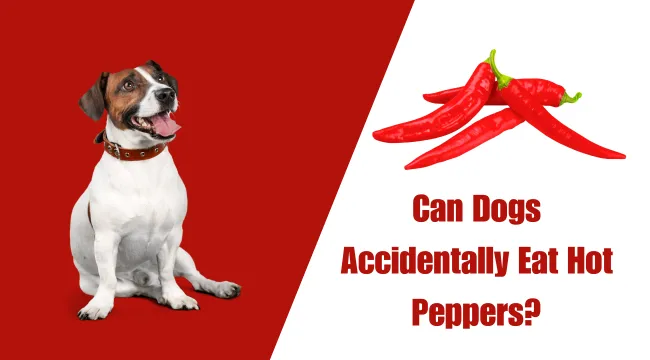
Can Dogs Accidentally Eat Hot Peppers? Yes, dogs can accidentally eat hot peppers. While not toxic, the spiciness (capsaicin) causes mouth/stomach irritation, leading to drooling, vomiting, or diarrhea. Offer milk or bread to ease discomfort. Most symptoms resolve in hours. If distress persists, visit the vet. Avoid spicy foods and keep peppers out of reach.
In this article, we’re going to break down the basics – can dogs really eat hot peppers by accident, what makes them harmful, and what steps we should take to keep our canine friends safe. Let’s explore this spicy topic in simple terms for the sake of our beloved pets!
Types of Hot Peppers and Their Impact
1. Black Pepper
A sprinkle of black pepper (from the Piper nigrum plant) in your dog’s food isn’t an emergency, but it’s not ideal. It can irritate their nose (think sneezing fits!) and upset their tummy, causing vomiting or diarrhea. If your pup raids your peppery leftovers, watch for discomfort and call your vet if symptoms worsen.
2. White Pepper
White pepper comes from the same plant as black pepper but is processed differently. While milder in flavor, it’s just as risky for dogs. Even small amounts can lead to stomach issues. Skip seasoning your dog’s meals with it—plain is safer!
3. Chili Peppers (Jalapeños, Habaneros, etc.)
Chili peppers contain capsaicin—the compound that makes them spicy. This can burn your dog’s mouth, cause excessive drooling, and lead to severe stomach pain or diarrhea. In rare cases, breathing trouble may occur. Keep all spicy foods far from curious noses!
Potential Health Concerns
1. Tummy Troubles
Spicy peppers (like jalapeños or chili flakes) can irritate your dog’s stomach, causing vomiting, diarrhea, or gassiness. Even mild peppers might upset sensitive pups. If your dog snacks on something peppery, call your vet if symptoms last more than a day.
2. Breathing Risks
Dogs can inhale pepper particles (think sneezing after sniffing black pepper!). This can trigger coughing, sneezing, or trouble breathing—especially in flat-faced breeds like pugs or bulldogs. Keep spices out of reach!
3. Allergies
Though rare, some dogs are allergic to peppers. Watch for itching, hives, or swollen face/ears. Act fast: Allergies can escalate quickly, so rush to the vet if you spot these signs.
Quick Action Plan:
- Mild symptoms: Offer water and bland food (plain chicken + rice).
- Severe reactions: Vet ASAP!
- Prevention: Skip spicy foods and seasonings in your dog’s meals.
Safe Snack Tip: Plain bell peppers (chopped, no seeds!) are a crunchy, vitamin-packed treat!
Symptoms of Pepper Ingestion in Dogs
Recognizing the signs of distress in dogs is essential for prompt intervention. Behavioral changes, gastrointestinal distress, and other physical symptoms serve as indicators that a dog may have ingested hot peppers accidentally.
Immediate Steps After Consumption
In the event of accidental pepper ingestion, quick and appropriate action is necessary. Pet owners should be aware of emergency measures to take at home and when it’s crucial to seek professional veterinary assistance.
Treatment and Recovery
Veterinarians play a crucial role in managing pepper-related incidents in dogs. From administering medications to providing dietary recommendations, their interventions contribute to a smoother and faster recovery process.
Preventive Measures
Prevention is the best medicine. Keeping hot peppers out of a dog’s reach, creating a dog-friendly kitchen and garden environment, and educating ourselves on potential hazards can significantly reduce the risk of accidental ingestion.
Alternative Dog-Friendly Treats
For pet owners looking to share treats with their dogs, there are numerous safe and enjoyable options available. From specially formulated dog treats to homemade snacks without harmful ingredients, alternatives abound.
Case Studies and Real-Life Incidents
Learning from the experiences of others can provide valuable insights. Real-life incidents shared by pet owners and veterinarians shed light on the potential risks and consequences of dogs accidentally eating hot peppers.
FAQ.
Can Dogs Eat Hot Peppers?
No, dogs should not eat hot peppers (like jalapeños, habaneros, or chili flakes). The compound that makes peppers spicy—capsaicin—can irritate their mouth, stomach, and intestines, leading to drooling, vomiting, diarrhea, or discomfort. Even small amounts can cause problems!
What happens if my dog eats a hot pepper?
If your dog eats a hot pepper, they may drool, vomit, or have diarrhea due to capsaicin irritation. Offer milk or bread to soothe their stomach. Monitor for distress; if symptoms worsen or persist, call your vet. Avoid spicy foods in the future.
Can dogs eat jalapeno peppers?
No, dogs shouldn’t eat jalapeños. While non-toxic, the capsaicin causes vomiting, diarrhea, or drooling. Offer milk or bread to ease irritation. Monitor for severe symptoms and consult your vet. Avoid spicy foods to protect your dog’s gut health.
Can Dogs Eat Bell Peppers?
Yes, dogs can eat bell peppers (red, green, yellow)—they’re non-spicy, safe, and packed with vitamins! Avoid spicy peppers (jalapeños, cayenne) as capsaicin causes vomiting, diarrhea, or drooling. Remove seeds and offer raw/cooked pieces. If your dog eats spicy peppers, offer water or food to ease irritation.
Will a little bit of pepper hurt a dog?
A little plain bell pepper is safe, but avoid spicy peppers (jalapeños, chili, etc.). Even tiny amounts of spicy peppers can cause vomiting, diarrhea, or drooling. Monitor your dog and offer water. If symptoms persist, call your vet.
Conclusion
In conclusion, while dogs may share our homes and even some meals, it’s crucial to be aware of potential hazards. Accidental ingestion of hot peppers can lead to various health issues for our canine companions. Responsible pet ownership involves understanding these risks, taking preventive measures, and being prepared to act promptly if an accidental ingestion occurs. By doing so, we can ensure the safety and well-being of our beloved four-legged friends.
Read More:
- Can Dogs Eat Cumin?
- Can Dogs Eat Octopus?
- Can Dogs Eat Oatmeal Cream Pies?
- Can Dogs Have Provolone Cheese?
- Can Dogs Eat Egg Rolls?
- Can Dogs Eat Tamales?
- Can Dogs Eat Yellow Rice?
- Can Dogs Eat Babybel Cheese?
- Can Dogs Eat Plantain Chips Safely?
- Can Dogs Eat French Toast?
- Can Dogs Eat Veggie straws?
- Can Dogs Eat Rotisserie Chicken?
- Can Dogs Eat Orange Chicken?
- Can Dogs Eat Durian Safely?
- Can Dogs Eat Cheerios?
- Can Dogs Eat Couscous?
- Can Dogs Eat Funyuns?
- Can Dogs Eat Acai?
- Can Dogs Eat Tuna?
- Can Your Dog Eat Onions?
- Can my dog eat this?




